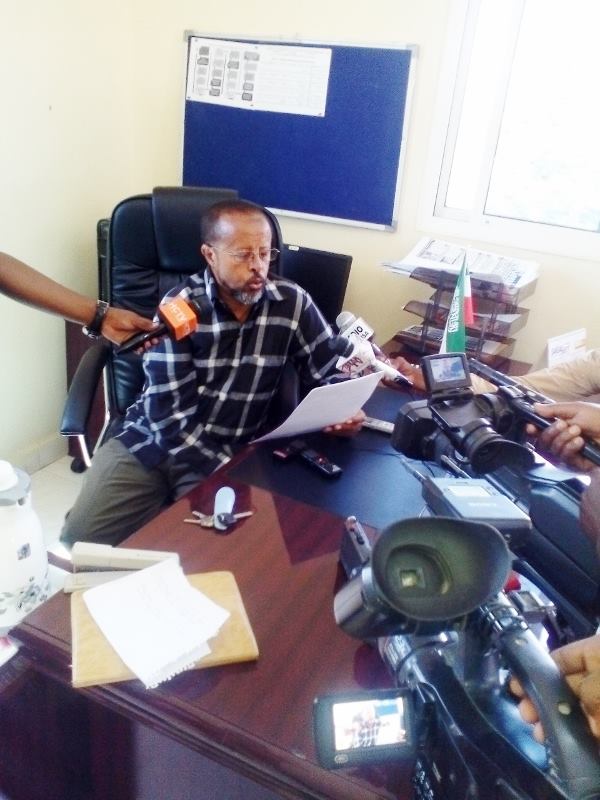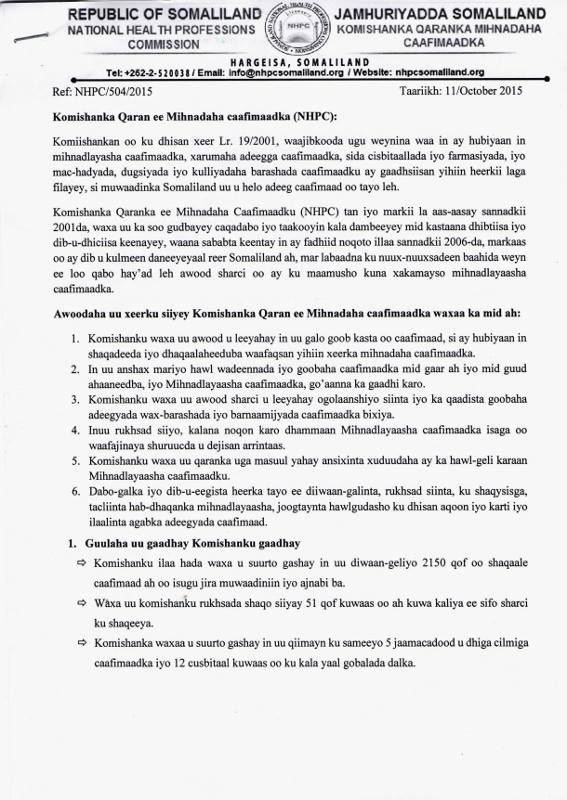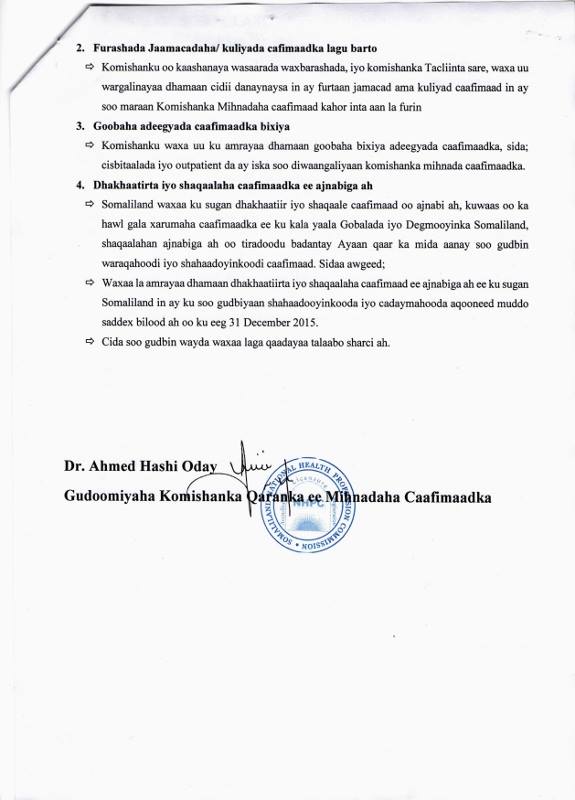Are you certain the doctor who is about to operate on you or your loved one is real doctor? The chances that he or she has proper medical training is very likely but there is a chance they do not have medical training or at least do not quality to treat your specific condition.
Why do we think there are fake doctors in Somaliland? Let’s start with the regulatory body that is legally in charge of vetting and ensuring that all medical professional have the right training and issues them a license to allow them to practice medicine in Somaliland – The National Health Professions Commission or the NHPC.
NHPC.
THE NATIONAL HEALTH PROFESSIONS COMMISSION
Like many government agencies in Somaliland, information related to the NHPC is very scarce, the best way to obtain relevant information is to actually visit their office in Hargeisa. The second best route is their shockingly outdated and insecure website http://www.nhpcsomaliland.org.


The NHPC is lead by its longtime Chairman Dr Ahmed Hashi Oday. A hardworking man by all accounts but if there is a particular detail that stands out about Dr Hashi it is that he is not a medical doctor. Dr Hashi is a veterinarian.
We have checked to see if Dr. Hashi has public health training to justify running an agency whose basic premise he is not qualify to understand let alone being the final word on who gets to practice medicine in Somaliland.
ENFORCEMENT AUTHORITY?
According to the NHPC’s website, their mission is ” Regulate the health professions, their education and practice, as well as the facilities where they practice, and to provide guidance to the health professions, policy makers, employers and the public on the practice, education, ethics and other professional issues in order to improve healthcare standards. In addition, NHPC is mandated to set training and education standards to Health Training Institutions and ensure that set standards are met and followed. “
So how well does the NHPC regulate medical professions in Somaliland?
According to the above communique by Dr Hashi in October 2015, a total of 2,150 healthcare professionals have been registered in Somaliland and only 51 of them were issued licenses. That is a dismal 2.372%.
Fast forward 3 years, according to their website, a total of 166 medical licenses have been issued. We are uncertain if this is complete but it is what is available on their website.
Assuming the total number of healthcare professionals in Somaliland remained the same as what Dr. Hashi reported in October 2015 of 2,150 that would mean only 7.72% of all healthcare professionals in Somaliland are licensed.

The registry shows quite a number of expired licenses. It is unclear if these healthcare professionals whose actual role in medicine is not defined on their license are still operating.

According to an active member of Somaliland’s medical community, none of the major doctors who operate in Somaliland are legally licensed from the NHPC.
Additionally, multiple sources tell Somaliland Chronicle that many doctors who own and operate major medical practices are not specialists and may have gone as far as general practitioner but perform hundreds of caesarean delivery operations a year.
REJECT LIST
NHPC has a section on their website that lists rejected medical practitioners, unfortunately either their vetting process is near perfect or it is not checking at all.
Though the list has not been updated since February 2017, they have managed to reject a total of 14 people. It is unclear why the list has not been updated or if there no additional rejects by NHPC.

MALPRACTICE OR DISCIPLINARY ACTIONS?

In Somaliland, there is absolutely no information related to medical malpractice or someone where patients can find if a doctor is facing a disciplinary action.
It is very hard to improve something unless there is a metric to track progress and metrics or information related to deaths or injury as a result of a medical procedure is impossible, something that the NHPC should be collecting as part of their enforcement and regulatory mandate.
TRUST IN MEDICAL PROFESSIONALS IN SOMALILAND
HE President Muse Bihi Abdi in a recent groundbreaking ceremony of a new wing in Hargeisa Group Hospital spoke of his vision to make Somaliland hospitals a place where patients from other countries come for medical care and to make sure our people do not travel for medical treatment. He added that “medical professional in India have the same training as you”, pointing to the Hargeisa Group Hospital staff gathered in the event.
President Bihi also spoke of the low confidence people have in medical care in Somaliland that they do not even trust the diagnostics and would travel for the simplest procedure that can be done here in Somaliland.
Unfortunately, lack of trust in medical professionals in Somaliland, especially those employed at main government run hospitals has less to do with customer service and attitude of the nurse or doctor but anecdotal evidence that being operated on in Hargeisa Group Hospital is a death sentence.
The only thing that would counter that fear is real metrics by the agency entrusted with regulating medical practice in Somaliland. The NHPC.
Somaliland’s Ministry of Health has zero control over the National Health Professions Commission, in fact the Commissioner, Dr. Hashi has fought tooth and nail to stay completely independent of the Ministry.
According to multiple travel agents in Somaliland, the number of annual travelers for medical reasons is in the thousands, potentially taking millions out of the country to seek medical attention from foreign countries.
The first step in restoring confidence in medicine in Somaliland is to create a proper and functioning regulatory not only that weeds out fraudulent doctors but holds licensed practitioners accountable for everything from continuing education, complaints, ethics violation and malpractice and has the power and mandate to revokes licenses for violation.
No country in the world has less than 10% of its medical professionals licensed to practice, until this changes, the possibility of fake doctors in Somaliland is very high.
Sign up for the QuackTrack.org newsletter below!















